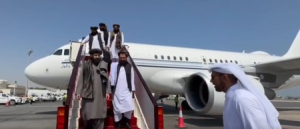World
Taliban Defence Minister Leads Delegation to Doha for Talks with Pakistan

A high-level delegation from the Islamic Emirate of Afghanistan, led by Defence Minister Maulvi Muhammad Yaqub Mujahid, has arrived in Doha for critical negotiations with Pakistan. This visit is significant as it occurs amidst escalating tensions between the two nations, particularly following recent military actions by Pakistan that have reportedly resulted in numerous civilian casualties.
The Afghan Ministry of Defence confirmed the delegation’s arrival on October 15, 2023. The backdrop to these discussions includes a series of airstrikes conducted by Pakistan that have claimed the lives of nearly 200 Afghans and around 60 Pakistani soldiers, according to various reports. The latest incidents have raised serious concerns regarding the fragile state of relations between the two countries.
Negotiations Amidst Conflict
The negotiations are reportedly mediated by Qatar and come at a time when both countries had previously agreed to a temporary truce. Despite this, reports indicate that Pakistani forces have continued operations along the Durand Line, leading to further tensions. Just days before the delegation’s arrival, Pakistan conducted airstrikes in Paktika province, resulting in the deaths of at least 17 people, including three Afghan cricketers. The strikes occurred in Khandaro village, where a targeted bombing injured 16 others, including women and children.
The airstrikes have intensified after Afghan Foreign Minister Amir Khan Muttaqi‘s visit to New Delhi the previous week, suggesting a possible correlation between diplomatic maneuvers and military actions. The absence of an official apology from Pakistan regarding these civilian casualties complicates the diplomatic landscape, creating additional pressure on Afghan negotiators to secure more substantial commitments from their Pakistani counterparts.
Key Players and the Diplomatic Landscape
The Pakistani delegation includes Defence Minister Khawaja Asif and intelligence chief Asim Malik, both known for their critical stance towards the Taliban. Asif has publicly accused the Taliban of aligning with India, while the Pakistani Foreign Ministry has labeled Afghanistan a “hub for transnational terrorism.” The effectiveness of the Pakistani delegation in convincing their Afghan counterparts remains uncertain.
As the talks unfold in Doha, regional stakeholders are closely watching for any developments that could alleviate the ongoing tensions. Qatar’s role as a mediator is pivotal, particularly in fostering dialogue between Kabul and Islamabad since the Taliban’s return to power. Given the backdrop of recent violence and the complexities of regional politics, the outcome of these negotiations could have significant implications for both nations and their citizens.
-

 World5 months ago
World5 months agoSBI Announces QIP Floor Price at ₹811.05 Per Share
-

 Lifestyle5 months ago
Lifestyle5 months agoCept Unveils ₹3.1 Crore Urban Mobility Plan for Sustainable Growth
-

 Science4 months ago
Science4 months agoNew Blood Group Discovered in South Indian Woman at Rotary Centre
-

 World5 months ago
World5 months agoTorrential Rains Cause Flash Flooding in New York and New Jersey
-

 Top Stories5 months ago
Top Stories5 months agoKonkani Cultural Organisation to Host Pearl Jubilee in Abu Dhabi
-

 Sports4 months ago
Sports4 months agoBroad Advocates for Bowling Change Ahead of Final Test Against India
-

 Science5 months ago
Science5 months agoNothing Headphone 1 Review: A Bold Contender in Audio Design
-

 Top Stories5 months ago
Top Stories5 months agoAir India Crash Investigation Highlights Boeing Fuel Switch Concerns
-

 Business5 months ago
Business5 months agoIndian Stock Market Rebounds: Sensex and Nifty Rise After Four-Day Decline
-

 Sports4 months ago
Sports4 months agoCristian Totti Retires at 19: Pressure of Fame Takes Toll
-

 Politics5 months ago
Politics5 months agoAbandoned Doberman Finds New Home After Journey to Prague
-

 Top Stories5 months ago
Top Stories5 months agoPatna Bank Manager Abhishek Varun Found Dead in Well









